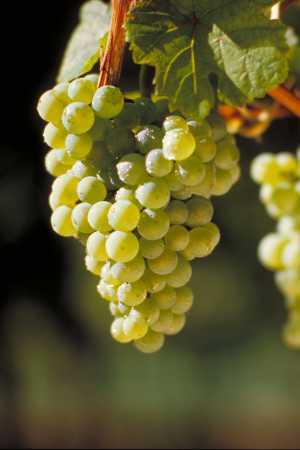Germany. Home to currywurst, techno and our national football arch rivals (insert comment about this year's Euros here). But what we don't talk about enough – and definitely should – is Germany's wine scene.
To describe it as burgeoning is to do it a disservice: the country has a wine tradition at least as old as ours. But somehow, many of us still don't know much about it.
There's a prevailing preconception that German wine is just about riesling, and sweet ones at that. But, as sommelier and importer Emily Harman of Berlin-based VinaLupa and wine-focused podcast Juice will tell you, this is, erm, kind of wrong. And you're missing out.
Here Harman debunks the myths around German wines, shares the regions and grapes to look out for, and explains why German wines go so well with food. Pour yourself a glass of riesling and read on...
What are the main German grapes to look out for?
Riesling is obviously number one, followed by pinot noir, which is known as spätburgunder. And then you're seeing a lot more good-quality müller-thurgau, silvaner, grauburgunder (pinot gris), weissburgunder (pinot blanc) and we're starting to see some other red grapes come along – lemberger, which is a blaufränkisch. They're definitely not as popular, but they've been popping up more and more over the last few years.
Riesling is the big ticket one. What makes it such an interesting grape?
Put simply, it expresses the soil better than any other grape, so you can really get a feel for where the wine comes from and how it's made. It's also great for making dry, sweet and sparkling wines, and wines that age really well, no matter which style they're made in. You can get some amazing riesling sekt as well, and it's ridiculous value. It ages nicely, and that's very much possible with any wines made with riesling, in my opinion.
Riesling expresses the soil better than any other grape, so you can really get a feel for where the wine comes from and how it's made
If you want to look beyond riesling, where should you start?
It depends on the type of wine you like to drink. The list above is a good place to start, but there are some interesting people making wines with müller-thurgau and it's definitely a grape I've been very fond of for the past few years [you can listen to Emily's podcast about it here].
There are also some very good examples out there of silvaner, especially in the region of Franken [which already had a long-standing wine making tradition that gave rise to the distinctive bocksbeutel-style wine bottle], where a big natural wine movement is kicking off. We're seeing it in other regions as well, but that's a really exciting area to look at.
Does Germany have a history of viticulture?
Yes! There are some estates that are more than 1,000 years old, and they've been following the same line of winemaking style for a while. But there are now lots of young upcoming growers that are more innovative and experimental. That's what's really exciting about Germany at the moment, this shift that's been happening in the last decade.
German wine regions – in pictures:
Why do you think that German wines have been so under the radar in the UK so far?
I think this has a lot to do with bulk wine coming out of Germany being sold very cheaply and it's often an off-dry riesling. Everyone then associates riesling with sweet wine and considers it undrinkable. Whenever I'm doing training, I always include the reminder that riesling isn't always sweet, it can be dry and it is in fact often dry.
Lots of us just don't realise that there's more to German wines beyond aromatic whites. There are wines with a bit more texture, wines that have more weight, but also wines that are light and fresh and dizzy.
You can get some light, very pure styles of silvaner and then you can get chardonnay or weissburgunder that has some oak on it, and it's more round. There's a lot of diversity in terms of style of wines to drink, it's just a case of them being lesser known.
Do you have any examples of new school German wine producers to look out for?
Weingut Roterfaden, they're in Franken. I particularly like their lemberger, that's a blaufrankisch and it's really reasonably priced. Newcomer Wines in Dalston are the importer, so check them out. For something a little bit more experimental and out there, try Bianca and Daniel Schmitt – their official name is DB Schmitt – from Rheinhessen, which is Germany's largest wine region and sits in the west, towards Luxembourg.
Why are so many sommeliers such huge fans of German wine?
There's a number of factors. For a long time German wine has been very much an underdog and you can really give someone an experience that they don't necessarily expect.
I think it could also be the fact that you can get a lot of older vintages more easily, because it's not like burgundy where it's immediately all bought up straight away and then it goes off the market.
And German wines in a restaurant context make a lot of sense because they're not overpowering. The complexity of good-quality riesling, and that acidity are also important. A lot of sommeliers have become more interested in terroir wines – so riesling fits the bill perfectly.
So what foods go well with German wines?
Everything! If we use riesling as the example, riesling is so versatile, depending on the way that it's made. It's often great with anything Asian. I really like Moroccan food and I drink riesling with tagine because of the spice and warmth. I find aromatic whites work really well – if you match something like a skin-contact aromatic white müller-thurgau with a chicken and preserved lemon tagine, it's the bomb.
And why does German wine go so well with food?
When people – sommeliers or those drinking at home – are choosing wines now and they're thinking about food and wine, they lean towards these lighter, fresher styles of wines, because you don't want something very concentrated and oaky that's going to dominate what you're eating.
It's also quite uncommon to eat really robust food. Especially in London, you're seeing more of a trend of people moving more towards balance in food and it's the same in wine, which is great for German wines.
If you match something like a skin-contact aromatic white müller-thurgau with a chicken and preserved lemon tagine, it's the bomb
I've noticed recently how important German pinot noir has become. This is especially for restaurants because burgundy has become so expensive. It's actually quite tricky to pour a red from Burgundy by the glass because the cost is so high. And there have been so many bad harvests that the volume is very low, so even if you can get the wine, you can't get lots of it. German pinot has come marching along and made a bit of a statement – the quality is good, but the wine is half the price.
I think we'll see a lot more German wines being paired in venues to replace the French appellations because of the accessibility and the price. The fact that it's been a little bit warmer in Northern Europe has also allowed a bit more generosity in the wine, too. Pinot noir is awesome, especially now that we've just come through game season – pigeon paired with a glass of really good German pinot is beautiful.
What German wines work well at Christmas?
Turkey and pinot noir would be great, and riesling with your prawn cocktail. A nice bottle of spätburgunder would be nicely indulgent without being too showy. And as for a sparkling to start, definitely a riesling sekt.
When I say riesling sekt, I'm talking about growers who are doing secondary fermentation in bottle on grapes that they have grown themselves in Germany. The laws around sekt are a little loose, so there are a few points to identify on a label: check it's bottle fermented and that it's Deutsche sekt and not from imported grapes. [You can find out more about sekt in this episode of Emily's podcast.]
These sekts are a lot cheaper than champagne, but they're often champagne-method. This means they're vintage and they get released a couple of years after they've been produced, and you get a lot of complexity but you keep all of the lovely aromatics.
Want to find out more about German wines? Head to germanwines.de


